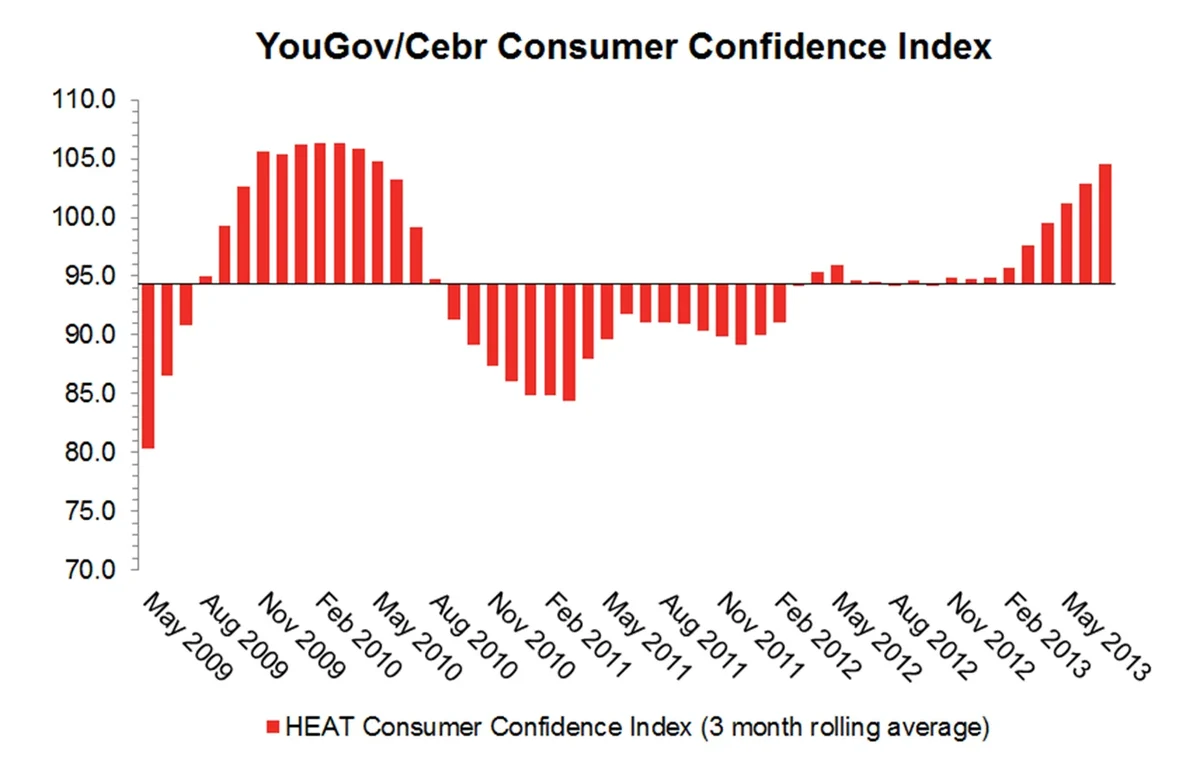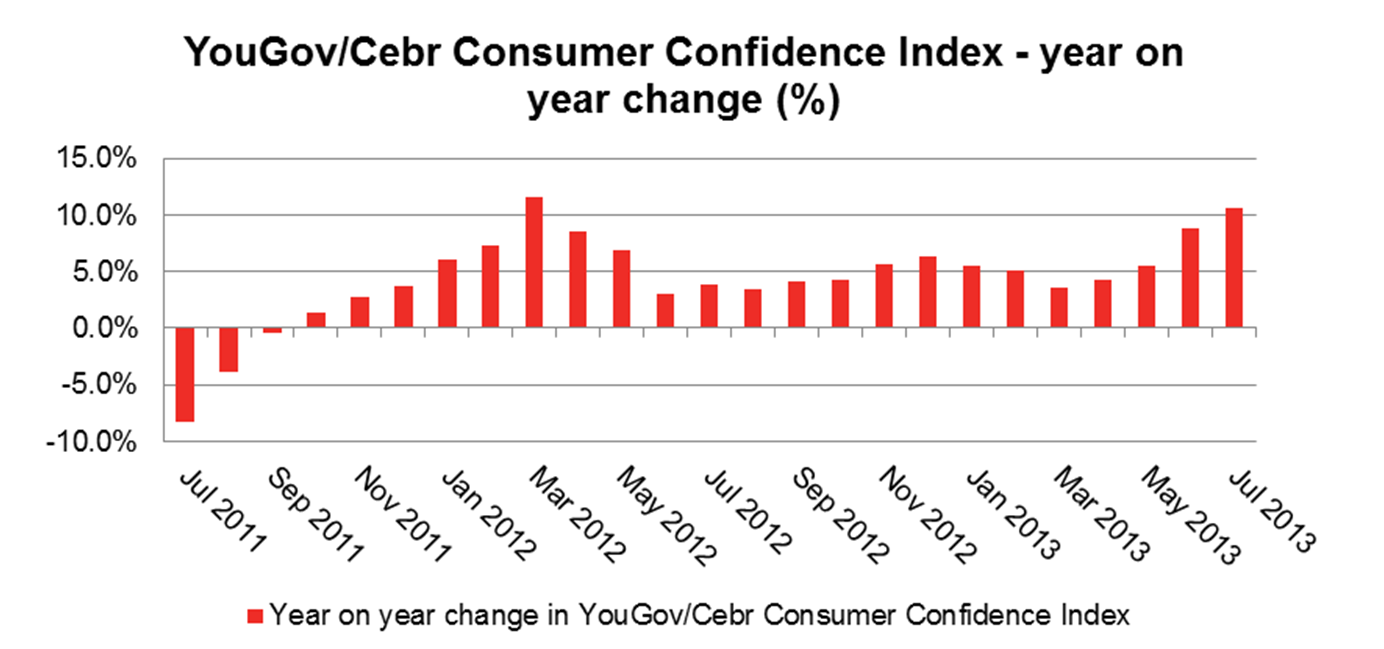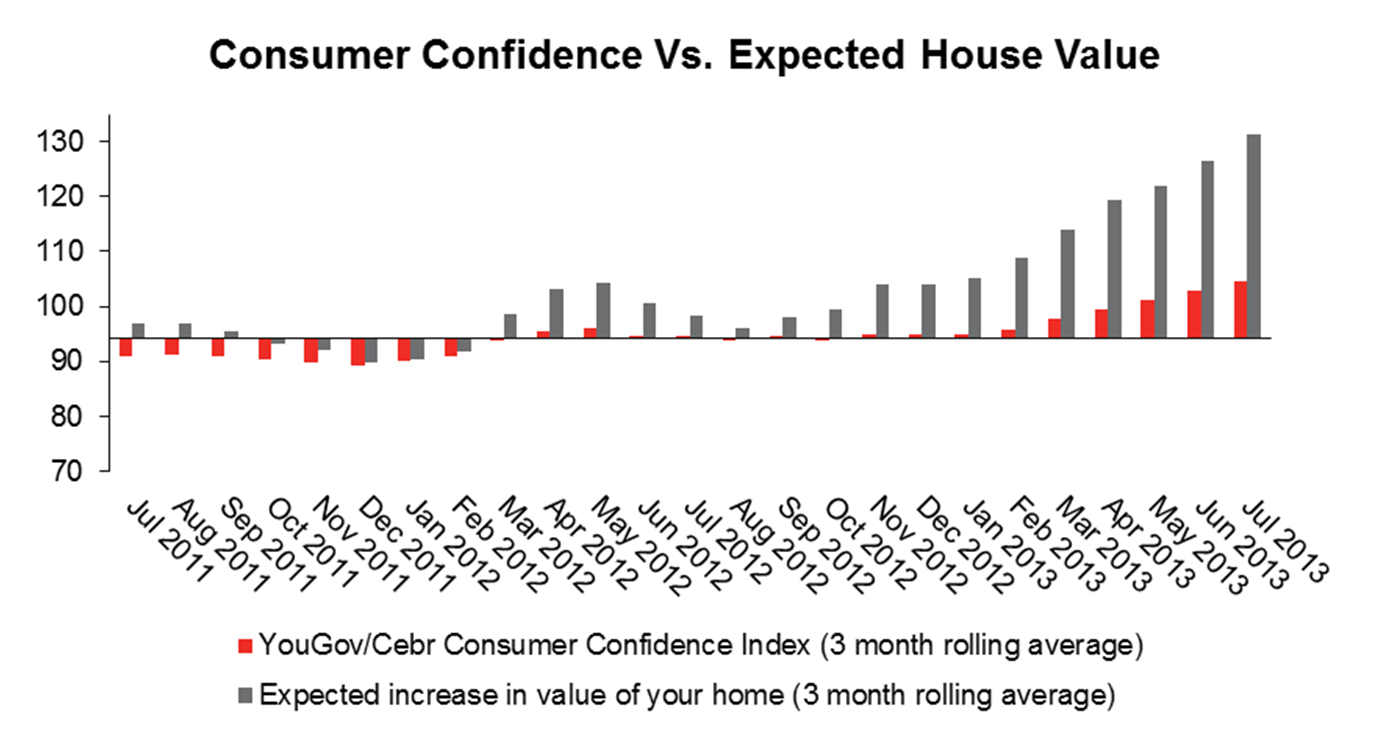New Cebr analysis of YouGov data reveals resurgent economic optimism and points to continued acceleration of the UK economy
The award-winning Centre for Economics and Business Research (Cebr) has joined up with YouGov, the leading market research agency, to analyse mountains of fresh data which reveal UK consumer confidence has improved sharply.
YouGov/Cebr’s new Consumer Confidence Index - based on YouGov’s Household Economic Activity Tracker (HEAT) data - shows that the economic optimism of UK households has strengthened significantly since the start of the year after twelve months of stagnation and three years of fragility since the economy decelerated from its initial bounce back in 2009-10. The Consumer Confidence Index stood at 104.6 in the three months to July – its highest point since April 2010.

Source: YouGov/Cebr HEAT data, July 2013; Notes: 3 month moving average of YouGov HEAT Consumer Confidence Index data. Axis value of 94.3 represents the average HEAT Consumer Confidence measure since the data set began
The surge since January 2013 follows a sustained period of improvement in households’ economic optimism with July’s ten point increase on the same period last year being the fastest annual growth rate seen since March 2012. It comes following 21 months of year-on year growth in YouGov/Cebr’s Consumer Confidence Index scores.

Source: YouGov/Cebr HEAT data, July 2013; Notes: 3 month moving averages for data on Consumer Confidence and expected increase in house value. Axis value of 94.3 represents the average HEAT Consumer Confidence measure since the data set began
YouGov’s data show the resurgence is down to a number of factors, not least homeowners becoming increasingly optimistic about the value of their houses. House price expectations increased for the eleventh straight month and are at their highest level since June 2010 and are more than thirty points up on this time last year.

Source: YouGov/Cebr HEAT data, July 2013; Notes: 3 month moving averages for data on Consumer Confidence and expected increase in house value. Axis value of 94.3 represents the average HEAT Consumer Confidence measure since the data set began
Additionally, workers have become increasingly less fearful about losing their jobs since the start of the year. During the three months to July 2013, a net balance of 41% of people thought it unlikely that they will be laid off over the next 12 months, up from a low of 38% in the three months to February 2013.
However, despite the improvement in consumer confidence, there are still areas of concern with consumers’ desire to save remaining strong. In the three months to July 2013, a majority (51%) of households would save a windfall payment rather than spend it. This number has been climbing slowly but steadily over the past four years and compares to 49% the year before and 45% in the three months to July 2009.
Cebr analysis of YouGov’s impressive vault of data as they compiled the results also reveals that the HEAT tracker indicated as far back as February that the mooted return to recession would not occur and economic conditions were strengthening in 2013, as has now become widely recognised. Moreover, the index has had a strong track record at capturing turning points in the economic environment, illustrating the recovery from deep recession in late 2009 and giving an early warning of the slowdown in 2010, which feed through to the real economy in 2011.
Stephen Harmston, Head of Syndicated Reports at YouGov, said: “British households are pulling out of a nosedive and consumers’ economic optimism is moving in the right direction. With consumer spending accounting for so much of GDP, households have a key role to play in economic growth. With the workforce starting to feel more secure in their jobs, home owners seeing an increase in house prices and credit becoming easier to come by, this upturn will have significant implications for consumer spending in the year ahead.”
Cebr Executive Chairman Professor Douglas McWilliams said: “YouGov are sitting on these wonderful data which effectively furnish economic predictions based on the very people who are the individual engines of recovery - the consumers. The HEAT analysis looks at an enormous sample of people with real life intentions, fears and hopes; tapping into this wealth of data enables Cebr and YouGov jointly to accurately predict the future path of growth.
“Our joint analysis now shows that over the past three months, fewer people are thinking that their household economic situation will worsen over the next year. This is another positive sign as the UK economy looks set to accelerate in Q2 and beat the Office for Budget Responsibility’s latest growth forecasts for 2013. The key question is how long this uptick can be sustained. The data illustrate that there are fragilities beneath the surface; nonetheless we are seeing real, sustained improvement in the UK economy – it’s the first time we’ve been able to say that since the initial recovery from deep recession in 2009.”
Key YouGov/Cebr HEAT findings for July 2013:
- Households still expect their financial situation to worsen over the next 12 months, but by significantly less so than in 2012. Over the next year, a net balance of 17% of households think that conditions will deteriorate, compared to a balance of 25% in the three months to July 2012.
- This is the strongest reading that this indicator has shown in three years, since May 2010.
- Employees have become more confident that they won’t lose their jobs in the next year. A net balance of 41% of employees in the three months to July said that they’re unlikely to lose their job in the next 12 months, up from a low of 38% in February.
- Roughly three in ten households expect the value of their home to increase over the next 12 months. This is the largest proportion since September 2010 and shows further strength in the housing market is expected, further building on the uptick in house prices seen in 2013 to date.
- However, the desire to save income remains strong. The proportion of households who would save a windfall payment rather than spend it continues to stand above the half mark, at 51% in the three months to July 2013. This figure has been climbing slowly but steadily over the past four years and compares to 49% the year before and 45% in the three months to July 2009.
- In line with this note of caution, Cebr’s latest Asda Income Tracker showed the UK average household’s discretionary income failed to grow at all year-on-year in June 2013; hence, while the HEAT data point to improvement across the board there are still notable pressures on household finances.
- In addition, intentions to reduce debt continue to increase. During the three months to July 2013, a net balance of 34% of households with mortgages intends to reduce the amount they owe on their house over the next 12 months. This is the largest balance since the series began in April 2011.









